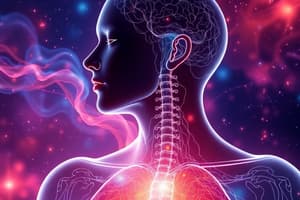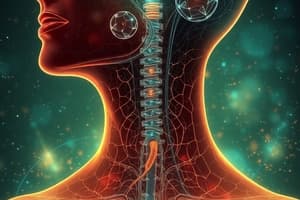Podcast
Questions and Answers
What are the objectives in the management of hypothyroidism?
What are the objectives in the management of hypothyroidism?
- Lowering serum cholesterol and preventing atherosclerosis
- Increasing oxygen delivery and reducing blood supply
- Restoring a normal metabolic state and preventing disease progression and complications (correct)
- Enhancing the effects of catecholamines and preventing arrhythmias
What can occur when thyroid replacement is initiated?
What can occur when thyroid replacement is initiated?
- Reduced serum cholesterol levels
- Angina and acute coronary syndrome (correct)
- Improved blood supply
- Decreased oxygen demand
Why can a reduction in blood supply be tolerated without overt symptoms of coronary artery disease in patients with hypothyroidism?
Why can a reduction in blood supply be tolerated without overt symptoms of coronary artery disease in patients with hypothyroidism?
- The myocardium becomes less sensitive to oxygen deprivation
- Blood viscosity decreases in hypothyroid patients
- Tissues require relatively little oxygen due to subnormal metabolism (correct)
- The heart becomes more efficient in utilizing oxygen
What is the signal that the oxygen needs of the myocardium exceed its blood supply?
What is the signal that the oxygen needs of the myocardium exceed its blood supply?
When should acute coronary syndrome be aggressively treated in patients with hypothyroidism?
When should acute coronary syndrome be aggressively treated in patients with hypothyroidism?
What must the nurse monitor for in patients with severe, long-standing hypothyroidism?
What must the nurse monitor for in patients with severe, long-standing hypothyroidism?
Why does the occurrence of angina and acute coronary syndrome increase when thyroid replacement is initiated?
Why does the occurrence of angina and acute coronary syndrome increase when thyroid replacement is initiated?
What is the main reason for giving thyroid hormone to patients with hypothyroidism?
What is the main reason for giving thyroid hormone to patients with hypothyroidism?
What can occur in response to therapy in patients with severe, long-standing hypothyroidism?
What can occur in response to therapy in patients with severe, long-standing hypothyroidism?
What happens to the oxygen demand when thyroid hormone is given?
What happens to the oxygen demand when thyroid hormone is given?
What is the effect of thyroid hormones on the cardiovascular effects of catecholamines?
What is the effect of thyroid hormones on the cardiovascular effects of catecholamines?
Why is it important to aggressively treat acute coronary syndrome in patients with hypothyroidism?
Why is it important to aggressively treat acute coronary syndrome in patients with hypothyroidism?
What is a crucial aspect of patient and family education for managing hypothyroidism at home?
What is a crucial aspect of patient and family education for managing hypothyroidism at home?
What should be done if angina or arrhythmias occur during thyroid hormone administration?
What should be done if angina or arrhythmias occur during thyroid hormone administration?
What is a common mistake regarding symptoms of hypothyroidism in older adults?
What is a common mistake regarding symptoms of hypothyroidism in older adults?
What is recommended for severe hypothyroidism and myxedema coma to maintain vital functions?
What is recommended for severe hypothyroidism and myxedema coma to maintain vital functions?
What is a potential concern when administering medications for hypothyroidism to patients?
What is a potential concern when administering medications for hypothyroidism to patients?
What is indicated for older patients with severe hypothyroidism and atherosclerosis to avoid confusion and agitation?
What is indicated for older patients with severe hypothyroidism and atherosclerosis to avoid confusion and agitation?
What is important for nursing care of patients with hypothyroidism and myxedema?
What is important for nursing care of patients with hypothyroidism and myxedema?
What is a common scenario for older women in relation to hypothyroidism?
What is a common scenario for older women in relation to hypothyroidism?
What is common among older women in relation to hypothyroidism?
What is common among older women in relation to hypothyroidism?
What follows the administration of hormone replacement for hypothyroidism?
What follows the administration of hormone replacement for hypothyroidism?
What is a potential consequence of older patients with severe hypothyroidism and atherosclerosis if their metabolic rate is increased too quickly?
What is a potential consequence of older patients with severe hypothyroidism and atherosclerosis if their metabolic rate is increased too quickly?
Study Notes
Management and Nursing Care of Hypothyroidism and Myxedema
- Discontinuation of thyroid hormone administration is necessary if angina or arrhythmias occur, and cautious, lower dosage resumption with close monitoring is recommended later.
- Severe hypothyroidism and myxedema coma require prompt, aggressive management to maintain vital functions, including cautious fluid administration and passive rewarming with a blanket.
- Nursing care of patients with hypothyroidism and myxedema should include careful monitoring of the effects of analgesic, sedative, and anesthetic agents, especially in older patients.
- Medications for hypothyroidism should be given with extreme caution due to potential altered metabolism and excretion, as well as respiratory status.
- Patient and family education is crucial for managing hypothyroidism at home, including proper medication administration, recognizing desired actions and side effects of medications, and the importance of nutrition and diet.
- Referral for home, community-based, or transitional care may be indicated, and the nurse should monitor the patient's recovery and ability to cope with changes.
- The prevalence of hypothyroidism increases with age, particularly among older women, and may be related to age-related alterations in immune function and multiple comorbidities.
- Subclinical disease is common among older women and can be asymptomatic or mistaken for other medical conditions.
- Symptoms of hypothyroidism in older adults may be atypical, with subtle symptoms such as fatigue, muscle aches, and mental confusion being attributed to normal aging, requiring close attention.
- Signs and symptoms of hypothyroidism in older adults may be atypical and may be mistaken for other conditions, with depression, apathy, decreased mobility, and weight loss being major initial symptoms.
- Older patients with severe hypothyroidism and atherosclerosis may become confused and agitated if their metabolic rate is increased too quickly.
- Marked clinical improvement follows the administration of hormone replacement, which must be continued for life, with periodic follow-up monitoring of serum TSH levels in older patients.
Studying That Suits You
Use AI to generate personalized quizzes and flashcards to suit your learning preferences.
Related Documents
Description
Test your knowledge on hypothyroidism management and prevention of cardiac dysfunction with this quiz focused on restoring normal metabolic state, hormone replacement, disease prevention, and complications management.




